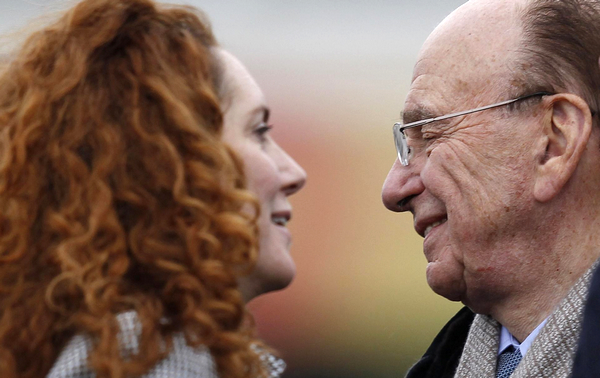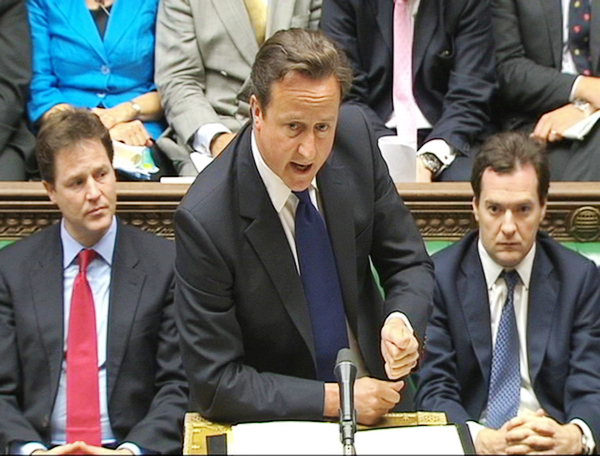Newsmakers
Murdoch defends papers as Cameron pledges probe
(Agencies)
Updated: 2011-07-07 09:48
 |
Large Medium Small |
|
 Rebekah Brooks, chief executive of News International and Rupert Murdoch, News Corp chief executive attend The Cheltenham Festival horse racing meet in Gloucestershire, western England in this file photograph dated March 18, 2010. Britain's Prime Minister David Cameron condemned on July 5, 2011 the alleged hacking of a murdered schoolgirl's voicemail by the News of the World, part of Rupert Murdoch's media empire, as the scandal closed in on a top executive and Murdoch protegee. Among those facing new questions about their conduct is Rebekah Brooks, now head of News Corp's UK newspaper arm and editor of the newspaper at the time of the teenager's death. Photograph taken March 18, 2010.[Photo/Agencies]
|
LONDON - Rupert Murdoch promised full cooperation on Wednesday to resolve a scandal shaking his media empire after British Prime Minister David Cameron promised an inquiry into what he called "disgusting" phone hacking by a newspaper.
Responding in parliament to allegations that the News of the World eavesdropped on voicemail for victims of notorious crimes, including child murders and suicide bombings, Cameron said he was "revolted" and would order inquiries, probably into both the specific case and more widely into Britain's cut-throat media.
The opposition, keen to highlight Cameron's own ties to Murdoch and to two former editors at the eye of the storm, noted that any inquiry would not start, let alone finish, for months if not years. Critics accused the Conservative government of trying to bury the embarrassment of the long-running saga.
Murdoch, whose News International group faces boycotts from advertisers and readers as well as questions over a takeover bid for broadcaster BSkyB, made a rare public statement to say he too found the hacking, and reports of buying tips from police, "deplorable and unacceptable" and would ensure transparency.
But the 80-year-old Australian-born American media magnate made clear he was standing by Rebekah Brooks, the 43-year-old head of his British newspaper operation. She was editor in 2002 when, police say, a News of the World investigator listened to -- and deleted -- voicemails left for the cellphone of missing 13-year-old Milly Dowler, who was later found murdered.
Cameron said: "We do need to have an inquiry, possibly inquiries, into what has happened." The prime minister faces questions over his own judgment in appointing Brooks'successor as editor, Andy Coulson, as his spokesman. Coulson quit Cameron's office in January, but denies knowing of any hacking.
Cameron, who regularly hosts Brooks at his home, said: "We are talking about murder victims, potentially terrorist victims, having their phones hacked into. It is absolutely disgusting."
In a further twist to the affair, a spokesman for Finance Minister George Osborne confirmed media reports that police had told the senior cabinet minister that his name and home number were in notes kept by two people jailed for phone hacking.
"Fully Cooperate"
Murdoch said in his statement: "Recent allegations of phone hacking and making payments to police with respect to the News of the World are deplorable and unacceptable.
"I have made clear that our company must fully and proactively cooperate with the police in all investigations and that is exactly what News International has been doing and will continue to do under Rebekah Brooks' leadership."
The leader of the opposition Labour party, Ed Miliband, said Cameron had made a "catastrophic error of judgment" in hiring Coulson as his communication director and said Brooks, a high-flying Murdoch confidante, should resign her current post. She says she knew of no illegal hacking while editing the paper.
|
 A video grab shows Britain's Prime Minister, David Cameron, addressing the house of Commons during Prime Minister's Questions in London July 6, 2011. Cameron Wednesday called for an official inquiry into allegations of phone hacking by newspaper journalists at Rupert Murdoch's News International.[Photo/Agencies] |
When its royal correspondent and an investigator were jailed in 2007 for hacking into the cellphones of royal aides to break a story about an injury to Prince William's knee, the newspaper insisted it was a case of one rogue reporter.
After campaigning by celebrities and politicians who suspected they too had been spied on, police launched a new inquiry in January and, following the arrests of several journalists, the affair has taken on dramatic new proportions.
Shares in Murdoch's News Corp, which also controls Fox television, the Wall Street Journal, London's Times and the New York Post among other titles, were down over 5 percent in New York, while shares in BSkyB fell more than 2 percent.
Major advertisers abandoned the News of the World.
Speaking for one carmaker Lance Bradley said: "Mitsubishi Motors in the UK considers this type of activity-- especially in such a distressing case-- to be unbelievable, unspeakable and despicable ... This is where we draw the line."
Internet campaigns and the actor Hugh Grant urged readers to boycott the paper which, if successful, may prove more damaging than political condemnation to Britain's best-selling Sunday paper, read by some 7.5 million people on sales of 2.6 million.
Sales of News Corp's daily sister paper the Sun never recovered in Liverpool after it offended the city's football fans in the wake of the 1989 Hillsborough stadium disaster.
"We need an inquiry that uncovers all the practices and the culture, not just of the News of the World but all tabloid journalism in this country," said Grant, a fixture of the gossip columns, who says he was a victim of phone hacking.
| 分享按钮 |